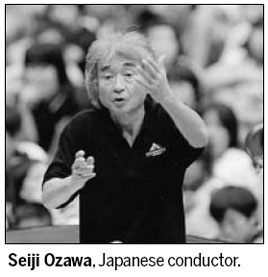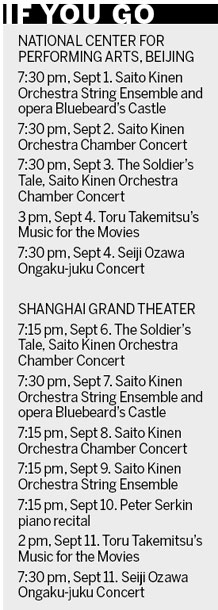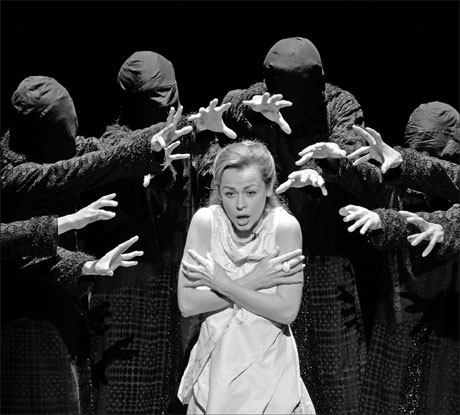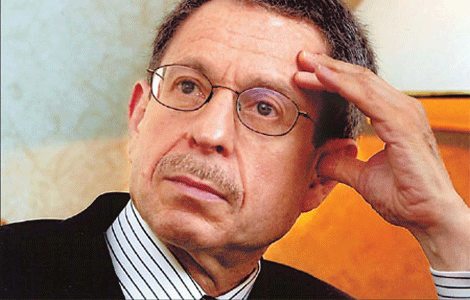A festival of note
Updated: 2011-08-26 07:56
By Chen Nan (China Daily)
|
|||||||||
|
Hungarian musician Bartok Bla Viktor Jnos' opera Bluebeard's Castle will be presented by Saito Kinen Orchestras and modern dance troupe Noism. Provided to China Daily |
Japan's popular Saito Kinen Festival of classical music comes to China for the first time. Chen Nan reports.
For celebrated Japanese conductor Seiji Ozawa, the Saito Kinen Festival is sacred, being a tribute to Hideo Saito, the cellist, conductor and stern but beloved mentor of Ozawa and others.
Since 1992, it has been held every August in Matsumoto, a small picturesque city surrounded by mountains.
 |
Ozawa, who had to cancel almost all his engagements because of surgery for esophageal cancer in January 2010, marked his triumphal return with an appearance at the 2011 Saito Kinen Festival, which began on Aug 21.
And for the first time, Ozawa will bring the Saito Kinen Festival to China, from Sept 1-4, at the capital's National Center for the Performing Arts, and from Sept 6-11, at Shanghai Grand Theater.
The performances in China will feature a wide range of musical styles and include a string ensemble, opera, symphony, chamber music, piano solo and movie soundtracks.
Ozawa will conduct the Saito Kinen Orchestra String Ensemble for Bluebeard's Castle and the Seiji Ozawa Ongaku-juku (Music Academy Orchestra) Concert.
Other highlights include Peter Serkin's solo concert, L'Histoire du Soldat, or The Soldier's Tale, by the Saito Kinen Orchestra Chamber Concert and Toru Takemitsu and his Music for the Movies.
Pieces such as Tchaikovsky's Serenade for String Orchestra and Romeo and Juliet Fantasy Overture, and Beethoven's Diabelli Variations will also be presented.
The festival evolved from the Saito Kinen Orchestra established by Ozawa in 1984, for a series of memorial concerts for the 10th anniversary of Saito's death.
 |
Since 1992, the annual festival has become a month-long carnival for fans of classical music.
The 75-year-old conductor shares a special bond with China. Ozawa was born in Shenyang, Liaoning province, in 1935. He spent a year, 1941, in Beijing and then moved back with his family to Japan.
"The Saito Kinen Festival has been held for 20 years and become an international event. I have a deep feeling for China, so I want to bring the festival to audiences here," the conductor says. "China has many talented musicians and I want more people to communicate through music.
"I still remember the hutong I lived in. I want to go back and taste the local food," he says.
He began his piano studies in Japan and when Saito took him to a performance of Beethoven's Symphony No 5, his musical career changed track from piano to conducting. He continued his studies with Austrian conductor Herbert von Karajan in then West Berlin, which fostered his love for opera. That led to his decision to present Bluebeard's Castle, the only opera work of Bartok Bla Viktor Jnos, the leader of Hungary's modern music, and a renowned pianist and folk musician, at the festival, which is also a highlight of his return.
"My teacher Karajan once told me that symphonies and opera are the two supporting pillars of music. That's when I started to learn opera and have been doing so till today," Ozawa says. "For Bluebeard's Castle, I have prepared for a long time and spent every morning learning the scores."
The one-act opera tells the story of Judith who marries a wealthy duke, Bluebeard; she insists on opening the seven doors in the dark castle of Bluebeard that gradually reveal the distorted soul of the duke.
For the festival, Ozawa will lead the Saito Kinen Orchestras, and director and choreographer Jo Kanamori will lead his dance troupe - Noism - Japan's most popular modern dance group.
The veteran conductor is also dedicated to educating and promoting young classical musicians.
The 2011 Saito Kinen Festival in Chinawill see the Seiji Ozawa Ongaku-juku Orchestra and Seiji Ozawa Ongaku-juku Chorus perform with Ozawa.
Ozawa founded the Seiji Ozawa Ongaku-juku in 2000 with the goal of nurturing young musicians through opera. While the first six years were devoted to opera, in 2006 they added symphonies to their repertoire.
"I was surprised by the young musicians in Japan and also in Asia. I want to share my musical knowledge with them and this was the aim behind setting up the Seiji Ozawa Ongaku-juku," he says.
Seiji Ozawa Ongaku-juku came to China for the first time in 2005 and in 2011, 32 young Chinese musicians enrolled with the orchestra.












